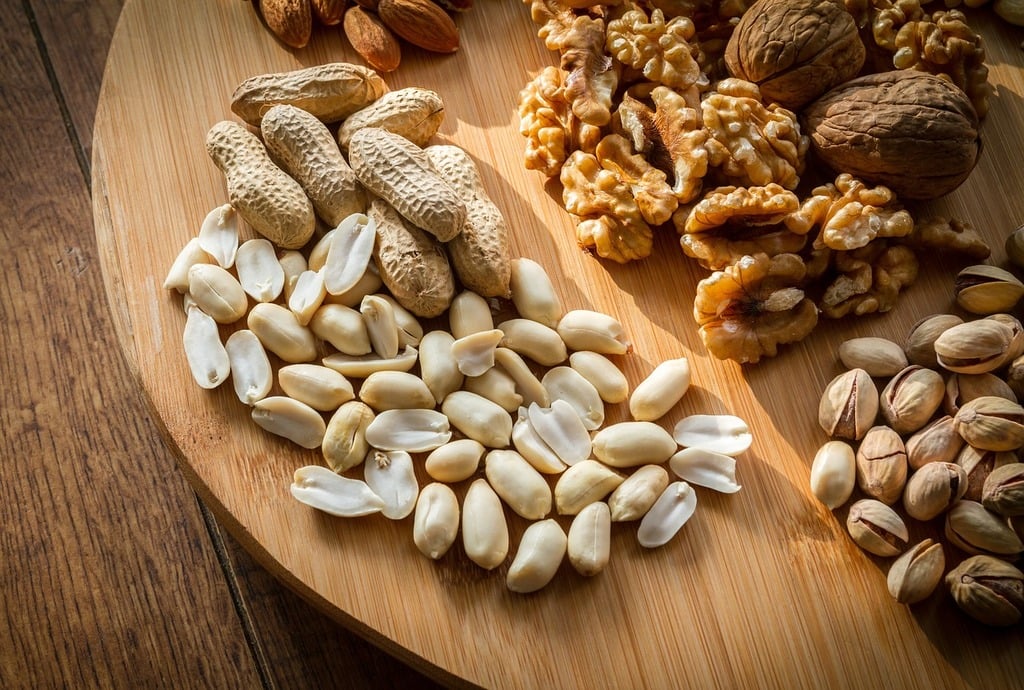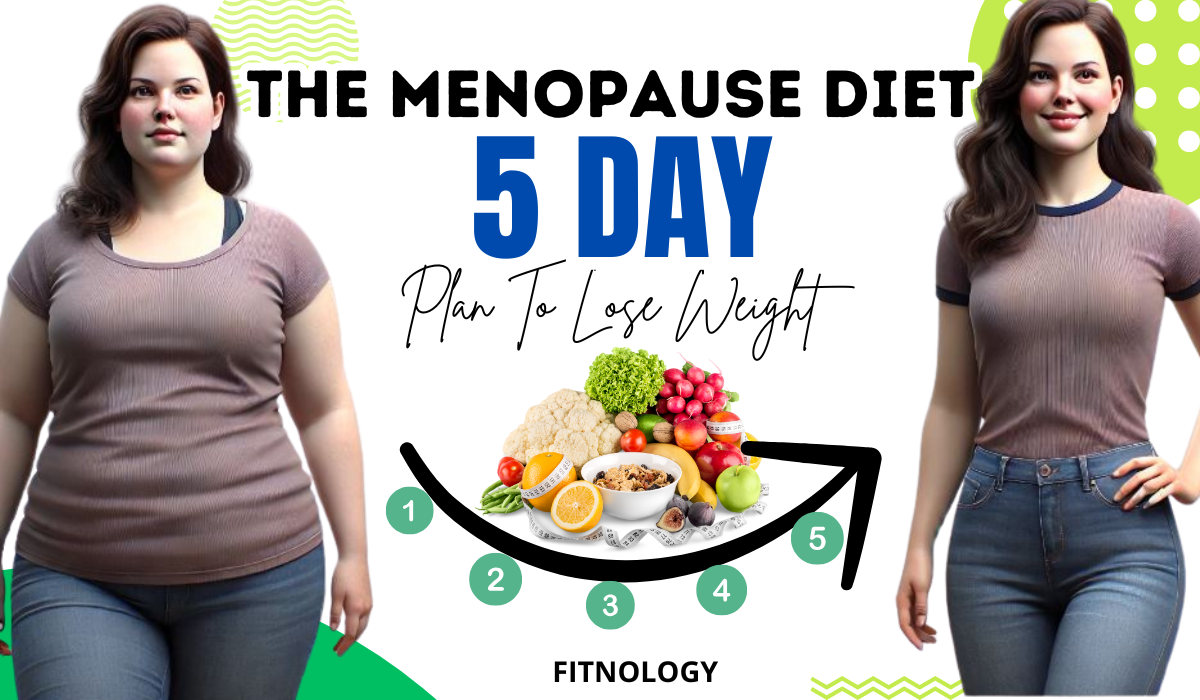What Is Menopause ?
Menopause is an inevitable stage in every woman’s life, yet can bring with it unwelcome changes like weight gain and metabolic slowdown as well as hormonal disruption. The Menopause Diet 5 Day Plan to Lose Weight is really effective.
If your weight has steadily been on the increase or it seems harder and harder to shed some extra pounds then research indicates this as being due to
- Decreased estrogen levels.
- Changes in metabolism.
- Lifestyle factors influencing weight.
But don’t panic: with the right approach and diet plan during menopause you can still effectively manage your weight and reach weight loss. Menopause diet plans go beyond simply cutting calories.
Instead they focus on creating smarter food choices to support the unique needs of this time for each woman’s body.

In this post I share an easy 5-day plan you can follow to kick-start weight loss during this phase, with practical and straightforward advice that should make weight management simple for all involved!
Why Menopause Causes Weight Gain ?
Weight gain is one of the primary complaints associated with menopause.
A study published by Obesity noted that during this transitional stage women tend to gain approximately two pounds annually and this weight often settles around their abdomen. There could be various reasons behind this gain.
Role Of Estrogen ?
As women approach menopause, estrogen, the hormone that controls fat distribution, drops sharply resulting in greater chances of fat storage in the abdominal region rather than hips or thighs. Muscle mass also tends to decline with age leading to slower metabolisms which result in less calories burned from body tissue being burnt off resulting in easier weight gain even with equal food consumption.
As part of menopause, lifestyle changes such as
- Decreased physical activity.
- Poor sleeping quality.
- Higher stress levels.
These often coincide with weight gain. When faced with hot flashes, mood swings or sleep disturbances it can be challenging to stick to healthy routines and stay on a path toward weight management.
The Menopause Diet Plan
An appropriate diet and exercise regime are both powerful tools for “Combatting weight gain and improving overall health” during menopause.
A menopaus-specific diet emphasizes nourishment with nutrient-dense foods while stabilizing blood sugar and managing inflammation with the goal of supporting hormonal equilibrium while simultaneously encouraging fat loss and muscle preservation.
Here’s a simple 5-day plan to get you started.
Day 1: Start with a High-Protein Breakfast
Eating a high-protein breakfast helps control hunger and stabilize blood sugar throughout the day. According to research published in The American Journal of Clinical Nutrition “Incorporating more protein early can result in less hunger later on” and therefore decrease overall caloric consumption and lead to weight loss.
Breakfast: Scrambled eggs topped with spinach and served on whole grain toast.
Snack: Greek Yogurt with Chia Seeds.
Lunch: Grilled chicken salad topped with olive oil and avocado for lunch.
Snack: Almonds and fruit slices.
Dinner: Baked salmon served over quinoa with steamed broccoli as side dishes.

Day 2: Focus on Fiber and Healthy Fats
Fiber is essential to digestion and keeping you feeling full after each meal, helping curb cravings while stabilizing blood sugar. Furthermore, healthy fats found in avocados, olive oil and nuts help balance hormones for increased energy and stave off fatigue.
Breakfast: Oatmeal with flaxseeds and walnuts for breakfast!
Snack: Snack of carrot sticks with hummus
Lunch: Tuna salad made with olive oil, mixed leaves and mixed vegetables is the perfect lunch!
Snack: A handful of mixed nuts is an easy and tasty afternoon treat!
Dinner: Grilled chicken served with roasted sweet potatoes and sauteed kale as sides.

Day 3: Embrace Plant-Based Foods
Plant-based foods contain vitamins, minerals and antioxidants which help combat inflammation caused by menopause as well as supporting digestion and metabolism. A plant-based approach doesn’t mean giving up meat altogether – rather, increasing intake of fruits, vegetables, legumes and whole grains is key.
Breakfast: Smoothie made of spinach, berries and plant-based protein powder.
Snack: Sliced cucumber topped with guacamole
Lunch: Chickpea Salad With Tomatoes And Cucumbers And Olive Oil
Snack: Apple slices with almond butter as a light snack option.
Dinner: Stir-fry of tofu with mixed vegetables and brown rice.

Day 4: Low-Carb, High-Energy Foods
On Day 4, choose foods low in carbohydrates but high in nutrients to prevent blood sugar spikes and crashes which could otherwise trigger cravings or energy slumps. Opt for foods which provide sustained energy sources while simultaneously feeding your body!
Breakfast: Scrambled eggs topped with avocado and tomatoes make an easy breakfast choice.
Snack: Cottage cheese topped with slices of strawberries
Lunch: Grilled turkey served over leafy greens with an additional serving of roasted vegetables for sides.
Snack: Almonds provide an energy boost with just one handful.
Dinner: Grilled shrimp served over cauliflower rice with asparagus as side vegetables for dinner.

Day 5: Hydration and Restorative Foods
By Day 5, it’s essential that proper hydration and nutrition help your body heal itself. Drinking enough water can support metabolism, digestion and skin health areas which often decline due to hormonal shifts during menopause. In addition to offering anti-inflammatory foods which provide joint comfort and alleviate fatigue.
Breakfast: Chia pudding made with almond milk and fruit topping it off with cinnamon for extra kick.
Snack: Celery sticks drizzled in almond butter are perfect as an evening treat!
Lunch: Grilled chicken served with steamed broccoli and quinoa.
Snack: A small bowl of mixed berries.
Dinner: Grilled turkey served alongside roasted Brussels sprouts and wild rice as side dishes.

Hormonal Changes and Their Role in Weight Loss
As estrogen levels decline during menopause, fat storage increases significantly around the abdomen making weight management even more challenging. Being aware of hormonal shifts may allow a diet plan tailored specifically for this stage to better help control weight management.
Stress in Menopause Weight Gain
High levels of stress during menopause increase cortisol production, an important hormone responsible for fat storage particularly around the belly region. Implementing relaxation techniques as an effective strategy against weight gain during this phase.
Sleep as an Essential Strategy to Manage Weight During Menopause
Poor sleep quality during menopause, however, can drastically alter metabolic activity and trigger hunger and cravings that inhibit weight loss efforts. Prioritizing good sleep hygiene as an integral component to helping regulate hormones and support weight management efforts.
Menopause Diet : Best Foods to Include
Foods rich in fiber, healthy fats and lean proteins such as avocados, quinoa and leafy greens help sustain energy levels and aid weight loss by stabilizing blood sugar and decreasing inflammation.
How to Manage Hot Flashes and Cravings
Reduce hot flashes by eating smaller, balanced meals throughout the day and limiting caffeine and spicy food triggers like caffeine or spicy foods as much as possible. Keep blood sugar stable with fiber rich and protein packed meals. Fiber will keep cravings at bay as will keeping blood pressure stable with fiber.
Strength Training Benefits for Postmenopausal Women
Strength training helps preserve muscle mass as you age, as well as speed up metabolism. Regular weight-bearing exercise also can increase bone density while simultaneously cutting fat levels to aid with weight management.
Menopause and Gut Health Are Tied Together
Gut health plays an essential part in digestion, immunity and hormone regulation. A diet rich in fiber and probiotics may reduce inflammation while making weight management simpler during menopause.
Supplements for Menopause Weight Loss
Certain supplements like magnesium, vitamin D and omega-3s may assist with hormone regulation, metabolism improvement and inflammation reduction. Before beginning any supplements it is wise to speak to a healthcare provider first.
Mindful Eating for Menopause
Mindful eating involves paying attention to hunger cues and eating slowly in order to prevent overeating and emotional eating, both common problems during menopause. By practicing mindful eating techniques regularly, this practice may even reduce emotional eating as hormones shift throughout our bodies and disrupted appetite control mechanisms.
How Can Women Cope With Menopausal Bloating
Bloating during menopause is common due to hormonal fluctuations and slower digestion, but simple strategies like cutting back on salt intake, increasing water consumption and eating easily digestible foods may provide relief from its discomfort.
The article provides a designed five-day diet plan focused on food that is rich in nutrients that are balanced in macronutrients and small portions to reduce the common symptoms associated with menopausal and aiding in the loss of weight.
The focus is on the inclusion of phytoestrogens and healthy fats with foods like fruits and vegetables this plan will aid in maintaining hormonal balance as well as your energy levels. In addition, it provides helpful strategies for fighting the cravings and keeping motivation up This guide is the ideal resource for women who want to improve their well-being and health throughout menopausal.

My Journey with Menopause Weight Gain
As soon as I understood how menopause affects weight gain, my diet changed accordingly and weight started coming off slowly but surely. By making changes that helped control my intake and my workout habits I managed to regain some sense of control over it all.
Staying Consistent with Diet
At first I found it challenging to stick to a healthy eating plan with all its temptations around, but soon discovered the key component was consistency. As soon as I began experiencing small improvements (better sleep or decreased cravings) this motivated me even further.
Progress is key rather than perfection!
Protein’s Role in My Menopause Diet
Addition of protein really made a difference for me. Keeping me fuller for longer periods and helping prevent late night hunger pangs was key in keeping my metabolism at its optimal levels. Furthermore, eating more satisfying meals also meant I maintained muscle mass better which ultimately kept my metabolism on track.
Finding Foods That Work for Me
My most profound change involved including more fiber-rich foods in my diet such as vegetables, fruits and whole grains. I was shocked at just how much better it made me feel; digestion improved significantly as did feeling less tired or bloated during the daytime hours.
Hydration and Energy Levels
Drinking enough water quickly became one of my main priorities. It took tracking my water consumption before I realized how dehydrated I actually was. Once hydrated, my energy increased significantly and even my skin started improving! Hydration is something I wish had been addressed earlier on my journey.
Be Kind to Yourself During This Phase
Final note of advice is patience for yourself as menopause can be an upheaval, yet small, consistent changes can help ease its impact. While taking steps toward self-improvement might take more time than initially anticipated, ultimately doing the right thing matters more than ever!

Conclusion
Menopausal hormone imbalance does not need to lead to weight gain and slow metabolism; by following an appropriate diet plan that addresses hormonal balance, metabolism and energy levels you can lose weight while feeling better during this transitional phase. Our 5-day plan provided here can be seen as just an initial starting point. What matters more than anything is making changes that you can maintain over the longer-term.
Keep this in mind that success doesn’t require perfection! Make small steps toward your own best solutions that work. Be patient, stay consistent and trust the process. You got this!
FAQS
1. What are the basics of menopausal nutrition?
Menopausal diets designed to support hormonal balance while simultaneously managing weight, can be effective ways of managing and supporting menopause symptoms.
2.Can menopausal weight be lost through diet?
Weight loss can indeed be achieved, provided we make smart food and lifestyle changes.
3.Why does menopause lead to weight gain?
Hormonal fluctuations, decreased metabolism rates and lifestyle modifications all play a part in weight gain.
4.What foods should I avoid during menopause?
Avoid processed, sugary snacks and refined carbs as much as possible.
5.How does protein aid menopausal weight loss?
Protein helps preserve muscle mass and keep you feeling satisfied for longer.
6.Are carbs bad during menopause?
No need for that. Rather try eating whole grains and limiting refined carbs for stable blood sugar levels.
7.Hydration during menopause can play what role ?
Staying hydrated boosts metabolism, digestion and energy.
8.How quickly can I expect results with this plan?
Results may differ, yet some noticeable changes can often become evident within one week.
9.Are exercise and the menopause diet compatible?
Absolutely, regular exercise helps boost metabolism and contributes to weight loss.
10.Are the plans appropriate for all?
Before embarking upon any diet plan, always seek medical advice first.


